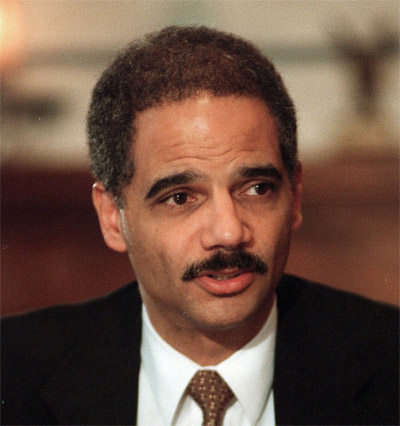Local child advocates are reacting favorably to United States Attorney General Eric Holder’s recent comments about the dire need for major juvenile justice system reform.
In remarks to the National Association of Counties Legislative Conference, Holder called for the Department of Justice to adopt a new approach that combines evidence-based research and comprehensive community partnerships. Holder also said that it’s time for us to ask some important questions such as; why is it that African-American youth make up 16 percent of the overall youth population, but comprise more than half of the juvenile population arrested for committing a violent crime? Why is it that abused and neglected children are 11 times more likely than their non-abused and non-neglected peers to be arrested for criminal behavior? And why is that so many of those who enter our juvenile justice system either can’t afford – or do not know to ask for – access to legal guidance? Some even plead guilty to criminal offenses without the advice of a lawyer. Read the full speech.
Some of the points Holder made in the March 7 address include:
- Serving our young people makes good economic sense by keeping them out of “over-stressed and under-funded corrections facilities and saving precious law enforcement resources.”
- How we treat our children speaks to who we are as a nation.
- It’s time to broaden our approach to juvenile justice – and to ensure that sound research and respected analysis are a part of our decision-making process.
- We must transition from a prosecution-and-punishment model to a prevention-and-intervention paradigm.
- We must adopt a comprehensive plan of action – one that engages law-enforcement partners, medical professionals, social services providers, lawyers, parents, teachers, coaches, mentors and community leaders.
- We as a nation must be smart, not just tough, on crime to help generate the positive outcomes we seek for our young people.
- Juvenile justice reform will also save the nation money in the long run.*The best—and most targeted—solutions will be shared solutions, "created together—after rigorous scientific evaluation and innovative resource levering."
- Evidence on our nation’s juvenile justice system demonstrates that change is needed because the current system does not spend resources as wisely as it should.
- Even though many of those who are incarcerated enter the juvenile justice system for non-violent offences, they often emerge violent – or, at the very least – traumatized.
- Each year too many of the 100,000 young people who exit formal custody have nowhere to go, return to unstable homes or end up in shelters, on the streets, or in other potentially dangerous or violent situations.
- Many juveniles who leave the system are not welcomed back to their community school and struggle to find educational opportunities.
- Juvenile justice reform must become a nationwide effort to bring systemic, not incremental, reform to our justice system.
Here’s what some local leaders and child advocates had to say about Holder’s comments.

Sen. Jones
Emanuel D. Jones, State Senator (D-Decatur)
“The attorney general spoke very powerful words regarding our system of Juvenile Justice. I agree with his call to action and we can do better by our kids. The system is broken and too many poor and children of color are being unfairly punished in a system that lacks accountability of their efforts to rehabilitate detained children. Our system of juvenile justice is broken and anytime institutions are allowed to profit off youth detention, justice is compromised. We need to remove this yoke from around lady justice' s neck and allow meaningful reform in our juvenile justice system. Alternatives to incarceration are available and I believe the Departments of Juvenile Justice must be given greater flexibility to rehabilitate children to include the authority to parole children in youth detention centers.“
Tanya Culbreth, Home-School Parent Liaison, B.E.S.T. Academy (an all-male Atlanta public middle and high school)

Culbreth
“We treat our children as sub-standard human beings -- not as human beings who can succeed -- and get sub-standard results. I agree that we need to implement more intervention and prevention methods on the front end and not the back end with prisons and detention centers. I also agree with the attorney general that it is time for major reform. This system is clearly not working. We need to look at where we are spending our resources. Working at an all black-male Atlanta Public School, his comments really resonate. He’s right about the racial disparities. The answer to this lies in the answer to the question; how do we engage a population that feels so disconnected? These young men come from families that also feel disconnected from mainstream society. They feel like the odds are stacked against them. The school-to-prison-pipeline is real. By cutting education spending and investing into prisons we are grooming our kids to go right into the prison system. Now many schools are merely teaching our kids how to past the standardized test. After that the teachers don’t have time or the energy left to explore, inspire and encourage the students. No Child Left Behind did just the opposite of the stated intent; No Child Left Behind has left everybody behind!”

Judge Teske
Steve Teske, Clayton County Juvenile Court Judge
“This past November I delivered a keynote speech at a conference in Washington D.C. sponsored by the Department of Justice on juvenile justice. Attorney General Holder made introductory remarks to my keynote speech. He shared the same information. My speech supported what he said. It is time we re-invent the juvenile justice system using evidence-based practices. However, evidence-based practices must include a system that is multi-disciplinary and supports evidence-based programs that effectively restore youth. Effective programs are only effective in practice when all stakeholders work together.”
Chara Jackson, American Civil Liberties Union (ACLU) of Georgia Legal Director

Jackson
“I am very pleased with what Attorney General Holder said. His comments speak to exactly what we’re trying to do in Georgia with SB 127, the juvenile code rewrite, led by JUST Georgia and other stakeholder groups. His comments really show people who have been committed to juvenile justice for years that we all really are on the same page. I think with the passage of the code rewrite in Georgia can be at the forefront of change in the juvenile justice system. Hopefully we are close to getting this measure approved in the Georgia Senate.”
Viveca Famber-Powell, Atlanta Defense Attorney
“I wholeheartedly agree with Mr. Holder. I have worked as a defense attorney for almost 30 years with much of that time defending and advocating for children charged with offenses from ungovernable to murder. At every level, incarceration is a tool that is always used too quickly. This is especially so in the most serious cases where the imposition of minimum mandatory 10 and 25 year prison sentences for children as young as 13 in cases where there is no loss of life or even injury is a routine occurrence in Georgia. These expensive prison dollars can be more efficiently, economically and successfully spent on supervision and services for more children. These services are already in place and work and can be shown empirically to be successful on most children, even in serious cases. The $180,000 it costs to keep a young offender in prison 10 years on an armed robbery can educate 45 boys in the public school for a year. If there is any way to avoid spending that $180,000 on one child, we should try it. There is ample research already to show that young offenders here can be rehabilitated, monitored and supervised in the community at a cost far less than the close to $500,000 per child it would cost to imprison that same child for 25 years as current law mandates. Crime and punishment is not what we should aspire to when we talk about children in the criminal justice system. The better identifier would be mistake and correction.”
